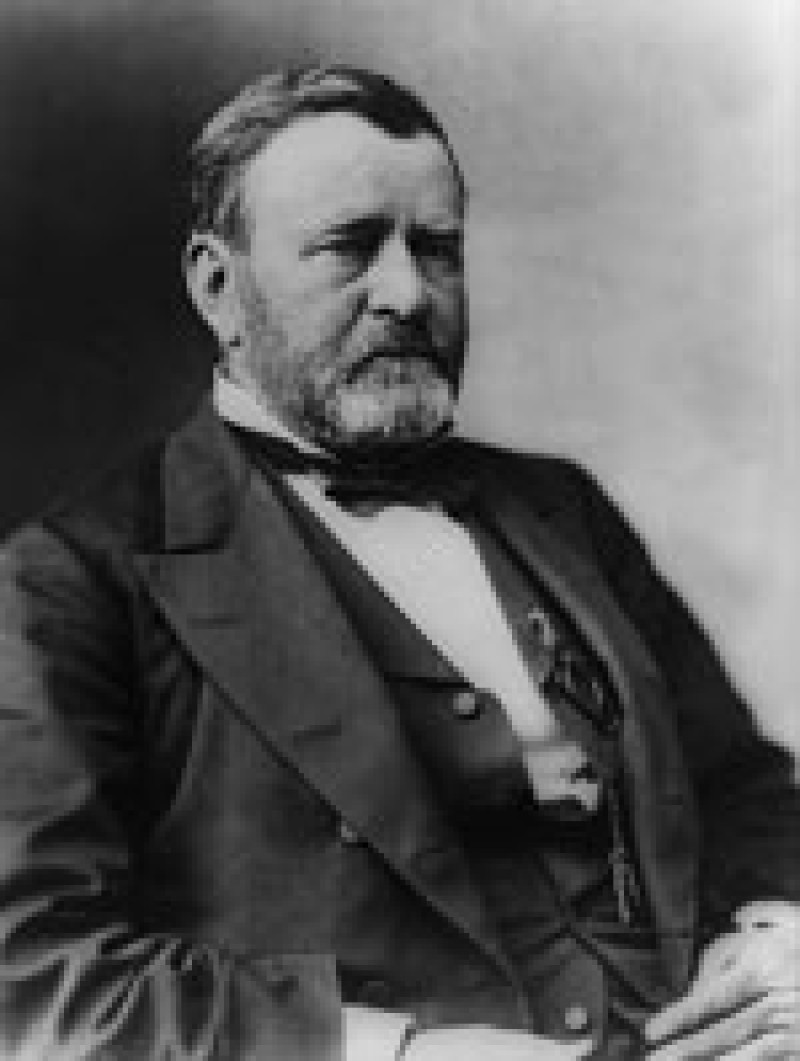Ulysses S. Grant (April 27, 1822 - July 23, 1885)
Ulysses S. Grant, Union army general and president of the United States, was born in Point Pleasant, Ohio. When he was a year old, the family moved to Georgetown, Ohio, where Ulysses attended local schools and worked in his father's tannery, a job he hated, and on the farm. Shy and reticent with people, Ulysses loved horses and developed extraordinary skills of gentle discipline and command over them.
In 1839 Grant was appointed to West Point, where he registered as Ulysses Hiram Grant, transposing his given names because he did not want to be known by the initials H.U.G. Due to a mistake by a benefactor on his application form to West Point, Grant was listed as "Ulysses Simpson Grant" (Simpson being his mother's maiden name). His nickname at West Point was "Uncle Sam."
Grant's four years at West Point were distinguished mainly by his horsemanship. Yet when he graduated in June 1843 (ranking 21st in a class of 39) the army in its wisdom assigned him to the 4th Infantry.
With little taste for a military career and hoping soon to secure appointment as instructor of mathematics (his best subject) at West Point, Grant joined his regiment at Jefferson Barracks in St. Louis on Sept. 20, 1843. Grant remained with his regiment until the Treaty of Guadalupe Hidalgo, yielding half of Mexico to the United States, was ratified in the spring of 1848.
Grant refused to pull political strings to obtain a colonelcy, so his friends, including Congressman Elihu B. Washburne and the prominent lawyer John A. Rawlins, pulled them on his behalf. In June he was named colonel of the 21st Illinois Volunteer Infantry. In August Grant was promoted to brigadier general.
In early November Grant received orders to create a diversion to draw off Confederate troops from another Union operation. He converted the demonstration into a full-scale attack on the Confederate outpost at Belmont, Missouri, across the Mississippi from Columbus, which the Confederates had fortified to block any Union traffic down the river.
Cut off from reinforcements, Confederate General Simon B. Buckner, a friend of Grant from West Point days and the Mexican War who had lent Grant money on his return from California in 1854, requested terms of surrender. Grant bluntly replied, No terms except an unconditional surrender can be accepted. I propose to move immediately upon your works. These words made Grant famous; the phrase unconditional surrender gave new meaning to his initials "U.S." He was promoted to major general, and President Abraham Lincoln began to keep an eye on him; he had won the most significant Union victories of the war thus far.
In mid-April 1863 Grant set in motion a campaign that won acclaim as the most brilliant of the war. Because of its high risks, Sherman and other subordinates opposed his plan, but Grant, like Robert E. Lee, was a great commander because of his willingness to take risks.
After Lincoln's assassination, Grant was the most popular man in the North and an almost certain Republican candidate for president in 1868, but first he had to navigate the treacherous shoals of Reconstruction. In the first national election in which a majority of black males had the right to vote (nearly all of them voting for Grant), the general carried his reputation as savior of the Union into the White House.
Polls of historians regularly rank Grant as one of the worst presidents. With no previous political experience, he relied on advisers who sometimes exploited his prestige for self-serving purposes. Yet the Grant administrations scored solid achievements that should modify the generally negative appraisal of his presidency.
The 15th Amendment, banning racial discrimination in voting rights, was enacted and ratified during Grant's first year in office. Congress also passed and Grant signed a civil rights act and three laws to enforce the 14th and 15th amendments that were stronger than anything done by the federal government again in the field of civil rights until the 1960s.
Grant settled down as a private citizen in New York City. In 1884 and 1885 he wrote three articles about his Civil War campaigns for Century magazine's Battles and Leaders series, revealing a previously unsuspected literary ability.
While writing the Century articles, Grant learned that he had incurable throat cancer. He accepted this verdict with the same outward calm and dignity that had marked his responses to earlier misfortunes and triumphs alike.
Some content and graphic elements featured on webpages related to the Thomas J. Moyer Ohio Judicial Center were used with the permission of the Ohio Historical Society; the Prints and Photographs Division of the Library of Congress; the Office of the Curator of the Supreme Court of the United States and American National Biography Online.
Biography of Ulysses S. Grant (April 27, 1822 - July 23, 1885)
Citation: James M. McPherson. "Grant, Ulysses S."; http://www.anb.org/articles/05/05-00291.html; American National Biography Online Feb. 2000. Access Date: Fri Oct 3 09:45:35 2003. Copyright © 2000 American Council of Learned Societies. Published by Oxford Univeristy Press. All Rights Reserved.
Portrait of Ulysses S. Grant - Library of Congress, Prints & Photographs Division.

